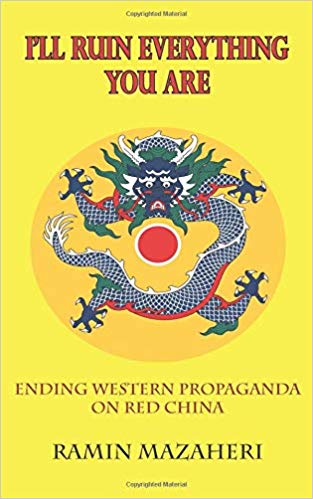Republised from the Saker blog
There are almost too many socioeconomic gains for me to list" and yet the idea that China's Cultural Revolution (CR) represented not gains but regression is dominant in the West.
The Chinese know better, and that's why I'm discussing Dongping Han's indispensable academic and investigative book: The Unknown Cultural Revolution: Life and Change in a Chinese Village. Han intensely examined rural Jimo County, where he grew up, interviewing hundreds of locals about the CR and poring over local historical records. Han was kind enough to write the forward to my brand-new book, I'll Ruin Everything you Are: Ending Western Propaganda in Red China. I hope you can buy a copy for yourself and your 300 closest friends.
When I ended Part 5 the Rebel Faction Red Guards (who wanted a People's dictatorship) had, over the course of three years, democratically bested the Loyalist Faction Red Guards (who wanted to maintain a Party dictatorship) a new generation of revolutionaries had been fostered and were now taking over. What did their time in power produce?
"Since the beginning of the Great Leap Forward, the Chinese Government had been talking about eliminating the three gaps: between urban and rural areas, between mental and manual labor, and between workers and farmers. " It was only during the Cultural Revolution that some students took it so seriously that they adopted it as a concrete goal of the struggle."
What's certain is that it's very hard to have a revolution in power and culture in just one generation; Iran tried to speed up their revolutionary timeline by implementing the world's second and only other Cultural Revolution just one year after ousting the Shah, whereas China waited 15 years.
The 1949 Revolution installed the collectives, which earned total Western capitalist-imperialist enmity for promising the "five guarantees (wu bao)" food, clothes, fuel, education for children and a funeral upon death. This was a revolutionary and unprecedented social security system for rural Chinese. However, the social safety net for urbanites was much, much better, which inspired justified resentment.
However, we cannot only discuss the first pillar of socialism redistribution of wealth; the second pillar redistribution of power was almost totally absent in Chinese village life 15+ years after their revolution. This is made apparent by the fact, related by Han, that it was not until spring 1967 that a mass meeting was held in Jimo to discuss the collective local planning and goals for the farm year. "This simple act turned villagers from passive followers into active participants."
I refer back to my mathematical summary of the CR decade's gains from Part 1: "You just read about 2 times more food and 2 times more money for the average Chinese person, 14 times more horsepower (which equates to 140 times manpower), 50 times more industrial jobs, 30 times more schools and 10 times more teachers during the CR decade in rural areas. "
We can only understand these massive, unprecedented gains in rural areas when we accept that the CR was only able to create it only via local empowerment of worker/citizens. After grasping that, it becomes easier to accept Han's primary, and revolutionary, assertion: that China's post-1980s boom rested on this explosion of economic and human capital in the rural areas, which represented 80% of the country in 1980.
Revolutionary gains in education for rural areas
The idea that the CR persecuted intellectuals is totally false the CR created them, via 30 times more schools and 10 times more teachers. An "intellectual" does not only mean someone with 2 PhDs an everyday person's standards are much lower, and they were certainly much more sensibly lower in 1960s rural China. Han's research thus describes a stunning great leap forward in rural education which occurred across the entire continent of China, a total inversion of the usual Western propaganda.
Why was China so backwards in 1966 that children were not going to school? Was it because of 17 years of CCP rule? This is what the Mainstream Media would have you believe" as if in the pre-socialist era the same widespread lack of education didn't exist. No, the backwardness should be attributed to their "Century of Humiliation" as colonial victims. Beyond colonialism, why did this not happen in 1600, 1700 or 1800? The answer is the advent of socialism. The basic building materials were all available locally the communes built all the high schools collectively what was needed was to cut out the capitalist view of economics and to institute the local empowerment of socialist democracy. The resources for building schools did not come from heaven, nor foreign banks villages collectively pooled their resources and worked together, i.e. socialism.
Where did they get the teachers? There were huge advertising efforts to get educated teachers to return to their hometown i.e, socialist culture, as opposed to individualist culture. "This policy, unpopular among many government schoolteachers, turned out to be a windfall for Jimo's joint village middle schools." Something like this is anathema to the West. It is a denial of absolute freedom, I agree, but it is also the promotion of equality. Socialism insists that one MUST give back; the West says "give back" if you feel like it", and then their culture encourages them to not feel like it.
The schools also ended the absurd, elitist, anti-intellectual emphasis on passing tests this policy was only necessary when spaces were so very few. But in the CR era,"All primary school graduates from the seven villages would automatically enter the middle school without any examination." The capitalist celebration of "academic competition" exists only to cover the fact that their state refuses to create enough schools for all the applicants.
Next Page 1 | 2 | 3 | 4 | 5 | 6
(Note: You can view every article as one long page if you sign up as an Advocate Member, or higher).






